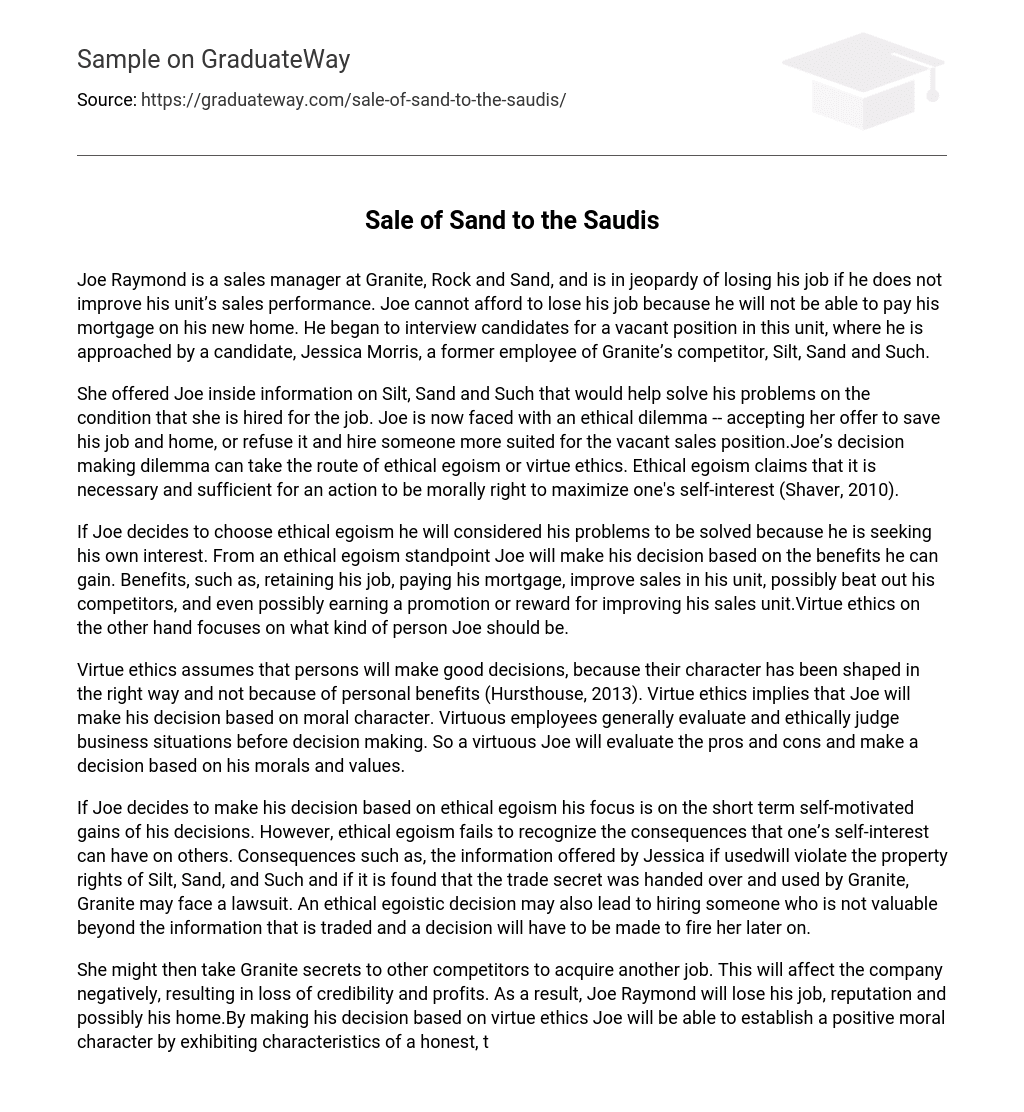Joe Raymond, a sales manager at Granite, Rock and Sand, faces the risk of losing his job due to the underperformance of his unit’s sales. The potential job loss is concerning for Joe as he relies on it to be able to afford his mortgage payments for his new home. During the process of interviewing candidates for a vacant position in his unit, Joe encounters Jessica Morris, a former employee of Granite’s competitor, Silt, Sand and Such.
She proposed to Joe that she could provide him with valuable insights on Silt, Sand, and Such, which could potentially resolve his challenges. However, she made it clear that her assistance would come at the condition of being hired for the job. This puts Joe in a moral quandary – whether to accept her offer to safeguard his job and home, or to decline it and find someone more suitable for the vacant sales position. Joe’s decision-making dilemma can be approached from either an ethical egoism perspective or through virtue ethics. Ethical egoism argues that an action is morally right when it maximizes one’s own self-interest (Shaver, 2010).
If Joe chooses ethical egoism, he will see his problems as solved because he prioritizes his own interests. Ethical egoism suggests that Joe’s decision-making should be based on the benefits he can receive, such as job security, mortgage payment, increased sales in his unit, potential triumph over competitors, and the possibility of a promotion or reward for enhancing his sales unit. In contrast, virtue ethics concentrates on the development of Joe’s character.
According to virtue ethics, individuals are expected to make ethical decisions not for personal gain, but because their character has been developed in a way that promotes good choices (Hursthouse, 2013). This means that Joe, being virtuous himself, will likely base his decisions on his own moral character. In the context of business, virtuous employees typically engage in ethical evaluation and judgment of situations before making decisions. Therefore, given Joe’s virtuous nature, he will likely weigh the advantages and disadvantages and rely on his personal morals and values to make his decision.
If Joe chooses to base his decision on ethical egoism, he prioritizes the immediate self-benefits of his choices. However, ethical egoism fails to acknowledge the impact that one’s self-interest can have on others. These impacts include the violation of property rights for Silt, Sand, and Such if Jessica’s provided information is utilized. In addition, if it is discovered that Granite received and used the trade secret, they may face legal consequences in the form of a lawsuit. Furthermore, an ethically egoistic decision may result in the hiring of someone who lacks value beyond the shared information, necessitating their termination at a later date.
In the event that she chooses to share Granite secrets with other competitors to secure a new job, it will have a negative impact on the company, leading to a loss of credibility and profits. Consequently, Joe Raymond will suffer the consequences by losing his job, damaging his reputation, and potentially his home. By making his decision based on virtue ethics, Joe can cultivate a favorable moral persona by demonstrating traits of honesty, truthfulness, and fairness.
By doing what is virtuously right, Joe will hire someone more suitable for the job, thus potentially enhancing his unit’s sales. Additionally, Joe will maintain a clear conscience and alleviate concerns about potential information leaks regarding his acquisition of stolen property. Consequently, Joe Raymond will prevent his reputation from being tarnished. The practice of virtue ethics will enable Joe to engage in logical, rational, and objective thinking.
He will prioritize the needs of the organization in an ethical manner, aiming for benefits for both himself and the company. It is challenging to make ethical decisions, especially when faced with circumstances like Joe’s. However, it is always advisable to rely on one’s moral compass rather than letting visions of rewards and self-gratification dictate decisions. The virtues of a good businessperson align with those of a good person (Boatright, 2009, p.).
79).





